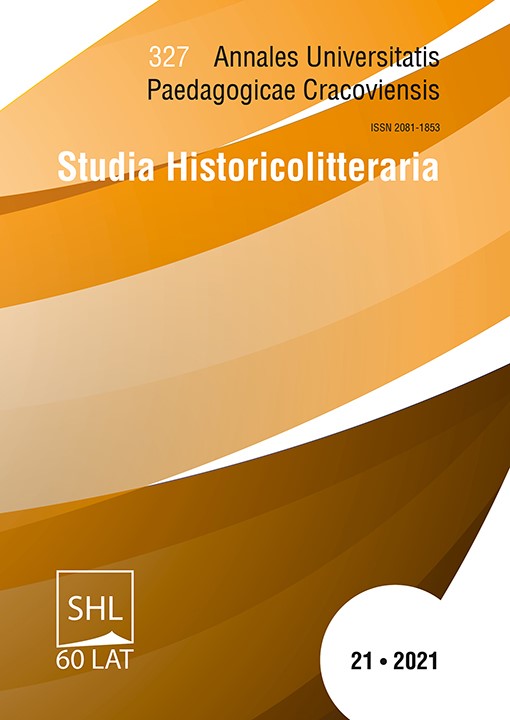„Polska Południa”? Wizerunek Portugalii w "Czterech powstaniach" Karola Hoffmana
Hauptsächlicher Artikelinhalt
Abstract
The aim of this article is to analyse the image of Portugal as presented by Karol Hoffman in his book 'Cztery powstania czyli krótki wykład sposobów jakimi dobijały się o niepodległość Grecja, Holandia, Portugalia i Polska' [Four insurrections that is how Greece, Holland, Portugal, and Poland were fighting for their independence] (1837). Hoffman creates an analogy between the situation of Poland in the partition era and the situation of Portugal when it was united with Spain under the Iberian Union (1580-1640). Comparing Polish efforts with the efforts of the representatives of other European nations,Hoffman tries to revealthe causes ofthe defeat of Poles. However, he has also managed to create an interesting image of the Portuguese that influenced the way the Polish readers regarded this nation in the 19th century.
Downloads
Artikel-Details

Dieses Werk steht unter der Lizenz Creative Commons Namensnennung - Nicht-kommerziell - Keine Bearbeitungen 4.0 International.
URHEBERRECHTE
Der Herausgeber der „AnnalesUniversitatisPaedagogicaeCracoviensis. StudiaHistoricolitteraria” ist zur Nutzung und Verbreitung aller in der Zeitschriftveröffentlichten Materialien auf Grundlage eines nicht ausschließlichen, zeitlich unbeschränkten Lizenzvertrags befugt, der im Voraus unbefristet mit jedem/r Autor/in des jeweiligen Werks für die im betreffenden Vertrag vereinbarten Nutzungsbereiche abgeschlossen wird.
POLITIK DES OFFENEN ZUGRIFFS
Die „AnnalesUniversitatisPaedagogicaeCracoviensis. StudiaHistoricolitteraria” sind eine Fachzeitschrift mit freiem Zugriff, dessen voller Inhalt kostenlos für Nutzer und Einrichtungen auf Grundlage einer nicht ausschließlichenCreativeCommons-Lizenz (CC BY-NC-ND 4.0) verfügbar ist. Die Nutzer/innen können die Artikel in dieser Zeitschriftohne vorherige Zustimmung des Herausgebers oder des/r Autors/in lesen, herunterladen, Kopien anfertigen, verbreiten, drucken oder zu Volltexten verlinken, insofern die Quelle des Zugriffs und der/die Autor/inder jeweiligen Publikation angegeben wird. Dies ist mit der BOAI-Definition des offenen Zugriffs konform (http://www.soros.org/openaccess).
Literaturhinweise
Anderson J.M., The History of Portugal, Westport, CT – London 2000.
Bachórz J., Z dziejów polskiej sławy Luisa Camõesa w XIX wieku, „Pamiętnik Literacki” 1976, z. 3, s. 43–60.
Bąk M., Portugalski bohater. Portugalska historia. Polski temat? O zapomnianym dramacie Aleksandra Przezdzieckiego, [w:] M. Bąk, L. Romaniszyn-Ziomek, „Gdzie ziemia się kończy, a morze zaczyna”. Szkice polsko-portugalskie, Katowice 2016, s. 51–74.
Beller M., Perception, Image, Imagology, [w:] Imagology. The Cultural Construction and Literary Representation of National Characters. A Critical Survey, red. M. Beller i J. Leerssen, Amsterdam – New York 2007, s. 3–16.
Besselaar J. van den, O sebastianismo – história summária, Lisboa 1987.
Danilewicz-Zielińska M., Król portugalski Sebastian w romantycznym dramacie Aleksandra Przezdzickiego, „Tygiel Kultury” 1998, nr 11–12, s. 75–77.
Danilewicz-Zielińska M., Reakcja Portugalii na wybór Jana Pawła II, [w:] tejże, Polonica portugalskie, Warszawa 2005, s. 170–174.
Dembowski K., Deux ans en Espagne et en Portugal pendant la guerre civile 1838–1840, Paris 1841.
Deszczyńska M., Wyobrażenie przedmurza w piśmiennictwie schyłku polskiego oświecenia, „Przegląd Historyczny” 2001, nr 3, s. 285–300.
Dziubiński A., Ostatnia krucjata. El-Ksar el-Kebir 1578, Warszawa 2014.
Hoffman K., Cztery powstania czyli krótki wykład sposobów jakimi dobijały się o niepodległość Grecja, Holandia, Portugalia i Polska, Paryż 1837.
Johnson H.B., Sebastian King of Portugal. Four Essays, Tuscon 2013.
Lopes D., Les Portugais au Maroc, „Revue d’Historie Moderne” 1939, nr 39, s. 337–368.
Lelewel J., Historyczna paralela Hiszpanii z Polską w wieku XVI, XVII, XVIII, Warszawa 1831.
Literatura polska. Przewodnik encyklopedyczny, t. 1, Warszawa 1984.
Łukaszyk E., Sebastianizm. W oczekiwaniu na idealnego władcę, który przypłynie z zaklętej wyspy, „Studia Iberystyczne” 2005, nr 4, s. 33–47.
Merson O., Wycieczka do Portugalii, „Wędrowiec” 1863, t. 1, s. 1–7.
Milewska E., Związki kulturalne i literackie polsko-portugalskie w XV–XIX wieku, Warszawa 1991.
Noonuccal O., Assimilation – No!, [w:] Macquarie Pen Anthology of Aboriginal Literature, red. A. Heiss i P. Minter, Sydney 2007.
Oliveira Marques A.H. de, Historia Portugalii, t. 1–2, przeł. J.Z. Klave, Warszawa 1987.
Pawiński A., Portugalia. Listy z podróży, Warszawa 1881.
Pérez López P.J., Historia y Destino. El fatalismo como identidad nacional lusa, „Diacronie. Studi di Storia Contemporanea”, t. 8: 2011, nr 4, https://journals.openedition.org/diacronie/3514?lang=en (dostęp: 3.03.2021).
Przezdziecki A., Don Sébastien de Portugal, Saint-Petersbourg 1836.
Serejski M., Studia nad historiografią Polski. Część I: K.B. Hoffman, Łódź 1953.
Tazbir J., Polska przedmurzem Europy, Warszawa 2004.
Tazbir J., Polskie przedmurze chrześcijańskiej Europy. Mity a rzeczywistość historyczna, Warszawa 1987.
Tripplin T., Wspomnienia z podróży po Danii, Norwegii, Anglii, Portugalii, Hiszpanii i Państwie Marokańskim, t. 6, Warszawa 1852.
Wordsworth Quillinan D., Journal of a Few Months’ Residence and Glimpses of the South of Spain, t. 1, London 1847.
Ziejka F., Wieczna pamiątka pomiędzy krześcijany… Z dziejów legendy Władysława Warneńczyka, ostatniego krzyżowca Europy, [w:] tegoż, Moja Portugalia, Kraków 2008, s. 335–353.
